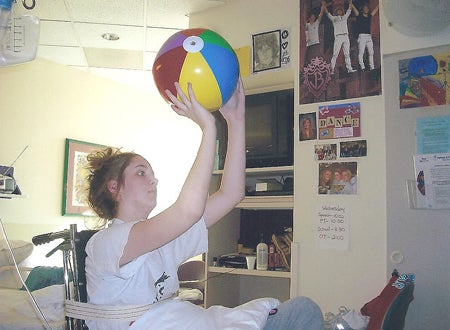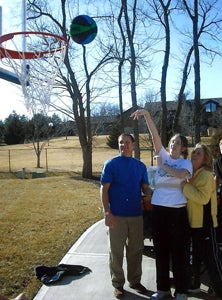
Maggie Meier rediscovered her shooting stroke with a beach ball in her hospital room. Now the senior is back in action for Blue Valley Northwest.
Courtesy photo
Good shooters aren't born that way. Rather, they develop their technique from countless hours of practicing the precise muscle movements needed to accurately launch a round orange ball through the air to its intended target of twine.
Once mastered, the best shooters never forget.
Maggie Meier of
Blue Valley Northwest (Overland Park, Kan.) was a player with a picture-perfect shooting form. And then her freshman year in high school, she stopped shooting.
It was November 2008, and instead of running up and down the court with her varsity teammates, the 5-foot-10 forward spent her freshman season lying in a hospital bed.
Meier's illness started when she experienced a week-long headache that eventually triggered a Grand mal seizure. She suffered more than 20 seizures the first night she spent at Children's Mercy Hospital.

Meier not only had to regain hershooting stroke, but also the balance necessary for consistent shots.
Courtesy photo
Turns out, it was just the beginning. She would spend Thanksgiving and Christmas with her parents and four siblings huddled around her bed, wondering if their loved one would ever celebrate a holiday again.
"At first we were optimistic because the doctors kept on telling us they thought she would recover quickly," Maggie's mother, Margaret, said. "But after weeks and then months, we became very concerned. At her worst times she could not swallow, eat, move or open her eyes. It was incredibly sad to see her in that condition. She had been such a vibrant, active girl who was now bedridden and could do nothing for herself."
Maggie's days at the hospital were spent drifting in and out of consciousness as her body valiantly fought a rare brain infection called mycoplasma meningoencephalitis, which is an aggressive form of meningitis. Her family never left her side when she was unconscious, and when she was awake, Margaret said she and the rest of the family — Margaret said Maggie's four siblings "probably had the biggest impact on her recovery" — always encouraged her to do more, including one of her favorite activities.
"We kept a beach ball in the room, and when Maggie was awake we would give it to her and she would grasp the ball, extend her arms and release it like she was shooting at a hoop," her father, Steve, recalled. "She even had her perfect follow-through. Seeing her be able to do that gave us hope."
When Maggie wasn't shooting the beach ball, there were plenty of times when she appeared to be losing the small battles toward recovery. She blue-coded twice and emergency response teams were summoned to keep her alive. Eventually, after 100 days, she was released from the hospital.
But then the real work of recovery began.
Maggie's illness had infiltrated much of her brain, causing memory loss and destroying her basic motor skills. The once-stellar student had to learn how to read and write again. She also had to relearn basic grooming skills, as well as figuring out how to get along socially with others. She returned to school functioning at a first-grade level, and quickly realized it was like starting over.
"The close friends that I had before weren't as close or friendly as they had been," Maggie reminisced. "A lot of my friends thought differently of me because I didn't act normal, or like I was before. It was really hard to go to school without being close to the people you have always been close to and also have your friends betray you.
"Relearning everything was hard at first. When I was in a classroom with my friends and we were taking a test, I would have to take the test in a different room because I was not as fast of a test-taker as other people. Eventually, I relearned things quickly and things came back to me easily, but my social life has changed a lot."
When the time finally came to get a basketball back in her hands, Maggie turned to head coach Dave Glenn, who was in his first year coaching when Maggie fell ill. She went from shooting that beach ball in her hospital bed to doing so from a wheelchair and then eventually while standing in the driveway. Like any good shooter, regardless of her body's position, she demonstrated perfect form.
"Maggie has a muscle-memory trait for shooting and it never left her," Glenn said. "It was amazing to watch and very rewarding. We also worked on balance and overall coordination and you would just see the gains every week. To watch that was just awesome."
Maggie returned to the basketball court her junior year, but played sparingly due to a bowel obstruction and subsequent surgery that sidelined her for almost eight weeks. This season, the versatile role player has helped the Huskies to a 10-6 record, and Glenn says when you watch her play now, it's as if she never missed a game.
"Her basketball IQ is really remarkable," the fourth-year coach said. "She could score a lot more, but she has an uncanny ability to pass out of the post and help get the ball to our best scorers in places they can score. She is so focused on the team, as good a shooter as she is, she doesn't worry about getting her own shot. She was just meant to play basketball and so to see her come back is pretty cool."
Glenn said one of the most remarkable things about his unselfish leader is that she never complains about what she went through and has never once used it as an excuse.
"The coolest thing about Maggie is that if you didn't read or hear about her situation, you'd never know what she went through," Glenn explained. "It's pretty amazing she's been able to put it behind her and not ever let anyone know what she's gone through."
Maggie doesn't remember much of what she went through during those 100 days. But she remembers enough to realize how much effort by others went into her recovery, and now, because of that, she plans to make a career out of helping others.
"I want to be a special education teacher," Maggie said. "I want to help others with disabilities. I am in a class right now called peer tutoring, where we help one-on-one with students who have special needs. Every time I see these kids it brightens my day."
Maggie spent her summer days the past three years in school so she could keep on track with her graduating class. She was recently inducted into the National Honor Society and is graduating this June, after which she plans to attend Benedictine College.
After that, the sky's the limit.
"I want to travel the world and share my story with others who are going through the same kind of thing," she said. "I treasure the little things in life like being able to walk, talking with friends, and of course playing basketball."
Jon Buzby is the sports columnist for the Newark Post, a freelance writer, and on the broadcast team for the 1290AM The Ticket High School Football and Basketball Games of the Week. You can reach him at jonbuzby@hotmail.com.
